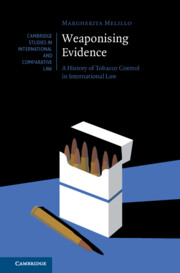286 results
4 - The Televised Humanitarian
-
- Book:
- UN Mediators in Syria
- Published online:
- 16 May 2024
- Print publication:
- 23 May 2024, pp 151-232
-
- Chapter
- Export citation
5 - The Double-Sidedness of Hindutva
-
- Book:
- The New Experts
- Published online:
- 09 May 2024
- Print publication:
- 16 May 2024, pp 133-161
-
- Chapter
- Export citation
5 - State-Society Relations
-
- Book:
- Energy Transitions in Central and Eastern Europe
- Published online:
- 19 April 2024
- Print publication:
- 04 April 2024, pp 103-128
-
- Chapter
- Export citation
Maternalism. Care and control in diplomatic engagements with civil society
-
- Journal:
- Review of International Studies , First View
- Published online by Cambridge University Press:
- 22 March 2024, pp. 1-21
-
- Article
-
- You have access
- Open access
- HTML
- Export citation
Constitutionalizing Mass Surveillance in the EU: Civil Society Demands, Judicial Activism, and Legislative Inertia
-
- Journal:
- German Law Journal ,
- Published online by Cambridge University Press:
- 12 March 2024, pp. 1-20
-
- Article
-
- You have access
- Open access
- HTML
- Export citation
Civil Society as an Informal Institution in Ukraine’s Judicial Reform Process
-
- Journal:
- German Law Journal / Volume 24 / Issue 8 / November 2023
- Published online by Cambridge University Press:
- 08 March 2024, pp. 1488-1502
-
- Article
-
- You have access
- Open access
- HTML
- Export citation
11 - Legal Mobilisation for Biodiversity Protection
- from Part IV - Environment
-
-
- Book:
- International Courts versus Non-Compliance Mechanisms
- Published online:
- 15 February 2024
- Print publication:
- 22 February 2024, pp 239-261
-
- Chapter
-
- You have access
- Open access
- HTML
- Export citation
3 - Human Rights in Practice
-
- Book:
- International Human Rights Law and Practice
- Published online:
- 08 February 2024
- Print publication:
- 15 February 2024, pp 104-157
-
- Chapter
- Export citation
16 - Nonprofits as Shaped by the Ruling Party
- from Part III - New Directions
-
-
- Book:
- Reimagining Nonprofits
- Published online:
- 11 January 2024
- Print publication:
- 01 February 2024, pp 313-332
-
- Chapter
- Export citation
14 - Nonprofits as Facilitators of National Self-development
- from Part III - New Directions
-
-
- Book:
- Reimagining Nonprofits
- Published online:
- 11 January 2024
- Print publication:
- 01 February 2024, pp 273-290
-
- Chapter
- Export citation
3 - The Activities of the FCTC Conference of the Parties
-
- Book:
- Weaponising Evidence
- Published online:
- 11 January 2024
- Print publication:
- 01 February 2024, pp 114-182
-
- Chapter
- Export citation
7 - Culture and Power
- from Part I - The Colours of Power
-
- Book:
- Power and Inequality
- Published online:
- 04 January 2024
- Print publication:
- 18 January 2024, pp 157-190
-
- Chapter
- Export citation

Weaponising Evidence
- A History of Tobacco Control in International Law
-
- Published online:
- 11 January 2024
- Print publication:
- 01 February 2024
The 2023 Update of the OECD Guidelines sets Stronger Standards for Companies but Weak Expectations for Governments – High and Lowlights from the New Text
-
- Journal:
- Business and Human Rights Journal / Volume 8 / Issue 3 / October 2023
- Published online by Cambridge University Press:
- 23 November 2023, pp. 427-433
-
- Article
- Export citation
4 - Cybercrime, the United Nations, Prospects, and Challenges for International Co-operation
-
-
- Book:
- Public and Private Governance of Cybersecurity
- Published online:
- 09 November 2023
- Print publication:
- 23 November 2023, pp 69-102
-
- Chapter
- Export citation
Contested Truths Over COVID-19 in East Africa: Examining Opposition to Public Health Measures in Tanzania and Uganda
-
- Journal:
- African Studies Review / Volume 66 / Issue 4 / December 2023
- Published online by Cambridge University Press:
- 22 November 2023, pp. 873-898
-
- Article
-
- You have access
- Open access
- HTML
- Export citation
15 - Revolution in England? Abolitionism
- from Part II - Western, Central, and Eastern Europe
-
-
- Book:
- The Cambridge History of the Age of Atlantic Revolutions
- Published online:
- 18 October 2023
- Print publication:
- 09 November 2023, pp 396-420
-
- Chapter
- Export citation
5 - Multiracial Civic Britishness
-
- Book:
- Multiracial Britishness
- Published online:
- 19 October 2023
- Print publication:
- 02 November 2023, pp 163-198
-
- Chapter
- Export citation
Culture, Class, and Politics in Late Imperial Congo - The Lumumba Generation: African Bourgeoisie and Colonial Distinction in the Belgian Congo By Daniel Tödt. Berlin: De Gruyter, 2021. Pp. 428. $79.99, hardcover (ISBN: 9783110708691); ebook (ISBN: 9783110709308).
-
- Journal:
- The Journal of African History / Volume 64 / Issue 3 / November 2023
- Published online by Cambridge University Press:
- 08 January 2024, pp. 463-465
- Print publication:
- November 2023
-
- Article
- Export citation



